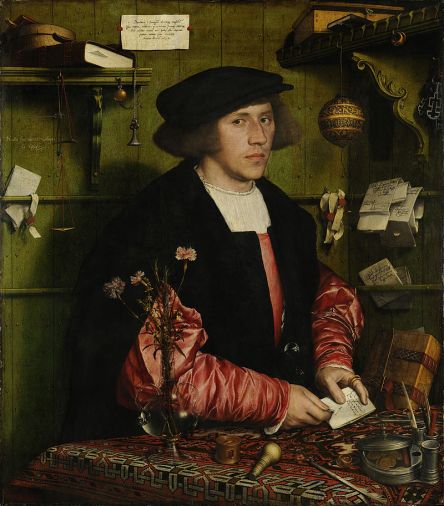
Hans Holbein the Younger, Portrait of Georg Gisze
Yesterday, I wrote about Britain’s leading but interdependent role in the Napoleonic Wars as an illustration of the fact that its greatest moments have not been self-generated but the result of meaningful international collaboration. Today, I would like to consider Britain’s trading networks in the light of the greatest European mercantile organisation prior to the EU, the Hanseatic League.
Many Brexiteers have claimed that although they object to the integration of laws and policy that has become a leading characteristic of the European Union, they broadly endorse its free trade aims. They heartily, though mistakenly, state that Britain’s involvement with Europe was a positive one so long as it was all about trade and not about politics. But it may be helpful to consider whether it has ever been possible to have secure trading alliances without making political compromises for the greater good.
In the Middle Ages, communities of merchants operating in northern European cities began to work with one another. Beginning with the three independent cities of Bremen, Hamburg, and Lübeck, the network known as the Hanseatic League eventually stretched as far as Poland, Estonia, and England. The Hanse communities were independent of each other but capable of collective action. They had a diplomatic system and even had the military capacity to enforce their terms of trade.
In London there were German merchants trading a century before the Norman Conquest and over time they obtained more privileges for the trade they brought to England. They had a headquarters fronting the Thames, called the Steelyard, and other outposts at the (then) major ports of Boston and Kings Lynn. The English used the Hanse to export wool to the Continent and to import much-sought-after German wine, a much more efficient means of accessing European markets than native merchants could have achieved alone.
They not only spread trade but were a vehicle for cultural dissemination. A young German artist, Hans Holbein, painted some of his first significant portraits in England with Hanseatic merchants as his sitters. Partly due to this, he soon came to the attention of the English elite and in time came to produce the distinctive image of Henry VIII that is still so recognisable.
In spite of this, in time groups of English merchants, thinking they could do a better job, gradually drove the Hanseatic merchants out. During the reign of Elizabeth I, the Society of Merchant Adventurers wanted to conduct trade on their own terms and in 1598 put pressure on the Queen to order them to leave the country. As one of the merchants sadly reported back to the League ‘we at last, because it could not be otherwise, with gloom in our hearts, went out of the door, and the door was shut behind us. May God have compassion.’
Typically, the merchants’ absence soon became conspicuous and a few years later they were allowed back; but things were never the same again.
The British continued to find a use for the Hanseatic League, even once they had tired of their mercantile services. During the Napoleonic Wars, the French emperor forbade European nations from trading with Britain or communicating with them diplomatically. The Hanseatic League, however, still retained a network of embassies, and these were vital in enabling the British to communicate with their allies on the Continent.
What is the lesson of this story? It is that when Britain opens itself to trade, it is a better place. Where money, goods, people, and culture can freely move this is a situation that can only be beneficial. We also learn that domestic arrogance can soon be regretted, and irreparably so; had the Merchant Adventurers not driven out the Hanseatic Merchants, what good might have been achieved. Without the League’s international diplomatic system there may have been no victory for Britain over Napoleon.
It is a mistake to cast aside the patterns of trade that have worked so well, a mistake to close Britain off from the freedom of movement of goods, services, and people, a mistake to assume that bureaucratic networks are inherently defective. Britain should embrace the European Union as once the Hanseatic League was embraced. It must not make the same arrogant mistakes that drove away our partners in trade.